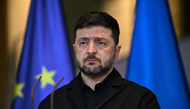When? Now

Chanah Park / Cypress High School 11th grade
My first memory of hearing a phrase of this sort was when I was in the second grade during Parent’s Night.
I was sitting next to my mom fidgeting with my skirt when I heard my principal state with such hope, “Parents, you are raising the generation that will become the future leaders of the world! The economy, world poverty, and climate change will all be solved by your children sitting next to you.”
This produced a thundering applause from the parents and ultimately left a burden on us. I am not alone. Fellow members of Generation Z, Lois Chun and Eunice Kim, attest to having felt this before.
Fast forward to the year 2020. We started the year, nay the decade, with horrendous fires burning through Australia, displacing endangered wildlife and people.
Five days later, the World Health Organization was notified of the COVID-19 outbreak in Wuhan, China. In the same month, the US and Iran communicated via missile which cost the lives of both Americans and Iranians and the impeachment trials of President Trump began.
Through February, the newly dubbed COVID-19 spread rapidly around the world. One month later, WHO declared the coronavirus to be a pandemic, President Trump declared the US to be in a state of national emergency, and the stock market went into correction.
In the next few months, schools shut down and society went into self-quarantine. Now, it has been two weeks since the unjust murder of George Floyd, a Black man, who died as a result of police brutality. Since then, the riots that have broken out have caused the National Guard to teargas masses and enforce curfews.
They expected us to fix this?
I am most definitely not saying that this is an impossible feat because I truly believe that it is entirely possible. But this brings my intended question: why do we, collectively as a society, procrastinate saving the world? We always say that the next generation will take care of it. However, I implore, what will there be left to fix when we cross over the line where salvageable meets unsalvageable?
The burden that Gen Z feels is something that every generation prior has most likely felt too.
So why do we keep letting history repeat itself? Clearly, this procrastination thing isn’t really working out for us, I mean just take a look around. Yes, Gen Z may play a large role in helping solve the world’s problems but I believe that there isn’t a generation that is going to fix anything.
No single generation can. So, the question is never going to be who, the real question we need to ask is when. So, when? Now.
Chanah Park / Cypress High School 11th grade
<Chanah Park / Cypress High School 11th grade>
스마터리빙
more [ 건강]
[ 건강]이제 혈관 건강도 챙기자!
[현대해운]우리 눈에 보이지 않기 때문에 혈관 건강을 챙기는 것은 결코 쉽지 않은데요. 여러분은 혈관 건강을 유지하기 위해 어떤 노력을 하시나요?
 [ 건강]
[ 건강]내 몸이 건강해지는 과일궁합
 [ 라이프]
[ 라이프]벌레야 물럿거라! 천연 해충제 만들기
 [ 건강]
[ 건강]혈압 낮추는데 좋은 식품
[현대해운]혈관 건강은 주로 노화가 진행되면서 지켜야 할 문제라고 인식되어 왔습니다. 최근 생활 패턴과 식생활의 변화로 혈관의 노화 진행이 빨라지고
사람·사람들
more
[송년행사 화보] “한 해를 마무리하며… 화기애애한 송년의 순간들”
LA 러너스클럽LA 러너스클럽(회장 김두병)은 13일 작가의 집에서 80여명의 회원과 가족이 참석한 가운데 송년회를 마쳤다. 2007년 창립된…

[송년행사 화보] “웃음과 감사 가득 ‘훈훈’… 함께해서 행복”
한국학교총연합회미주한국학교총연합회(회장 이영숙)가 주최한 제43회 장기 근속교사 포상 및 송년의 밤 행사가 140여명의 교사들이 참석한 가운데…
[송년행사 화보] “친구야 반갑다… 선배님들 모두…
경남중고경남중·고등학교 남가주 동창회(회장 예해덕)는 지난 6일 송년회를 열고 동문 및 가족 60여 명이 참석한 가운데 끈끈한 우정을 확인했다…
송년행사 게시판
월남전 참전자회월남전 참전자회 캘리포니아지회(회장 김종식)가 오는 17일(수) 오전 11시 LA 한인타운 해피음악원(2426 W. 8th St…
[송년행사 화보] “올 한 해 보람 가득… 내년에…
서강대남가주 서강대 동문회(회장 이정은·이사장 이찬근)의 2025년 정기총회 및 송년의 밤 행사가 지난 6일 웨스트리지 골프클럽에서 열렸다. …
많이 본 기사
- 출퇴근길에 갇힌 한인들… ‘시간·건강·돈’ 삼중고
- 캘리포니아 플라스틱백 퇴출 앞두고… 대형 체인, 종이봉투로 속속 전환
- 취임 1년 앞두고 기세 꺾인 트럼프
- 신년 전야 남가주 폭탄 테러 모의… 4명 체포
- 노로바이러스 변종 확산 어린이·고령자 감염 주의
- “뜨거운 음료 사 와서, 후배 때려”..팝핀현준 ‘폭행 미투’ 터졌다
- 연말연시 여행객 사상 최대 전망
- 에어프레미아, 연말 할인 프로모션
- 한인 팔레스타인 활동가 체포
- ‘만취 실신’ 라쿤 알고보니 ‘상습범’
- 시드니 총격 테러 IS 연관 수사확대
- 송미숙 뉴저지한인회장 선출
- LAPD 증원… 시장과 시의회 정면충돌
- 워싱턴 일원 유대인 커뮤니티 ‘비상’
- 미 전국서 50세 이상 살기 좋은 곳
- 워싱턴 지상사 송년회
- “피고소만 5건” 박나래 ‘주사이모’ 고발 건, 검찰서 경찰로 이첩..왜?
- “날씨는 춥고 일자리는 없네요”
- ‘주님 보시기에 부끄럽지 않은 삶이길’… 11학년 강지은 특별상
- 뉴스타부동산그룹, 창립 37주년 송년모임·시상식 성료
- 착한 일만 하면 천국 간다?… 교인 상당수 기독교 교리 배치 믿음
- 25년이상 운영‘식당’에 세제혜택 추진
- ‘해리가 샐리를 만났을 때’ 감독 부부 피살
- 칠레도 휩쓴 우파 물결… ‘트럼프 닮은꼴’ 카스트 당선
- 이종호측 “김건희에 3억 수표 전달”…법정서 돌발 주장
- 중일 갈등… 일본 54년 만에 ‘판다 제로’
- 전원주 “숙대 졸업 후 앞치마 입는 연기만..부끄러웠다” 고백
- 로봇청소기 ‘아이로봇’ 파산보호 신청
- 은퇴 이후를 지탱하는 소득 구조의 과제
- 젤렌스키 ‘나토가입 포기’ 시사 “확실한 안전 보장 있어야”
- 뉴욕 센트럴파크에 ‘뷔 벤치’ 생겼다
- MD 체육회장 입후보 등록 시작
- 버지니아, 도로 상태‘전국 2위’…MD 13위·1위 GA
- 젤렌스키 “푸틴이 종전안 거부하면 미국에 장거리 무기 요청”
- 한국 3월 A매치 상대 한 팀 사실상 확정... 오스트리아 감독 ‘평가전 인정’
- 테슬라 주가 올들어 최고…사상 최고치도 연내 경신하나
- 건축회사 누보하우스
- 트럼프, MAGA 내부서도 식나… ‘매우 지지’ 8개월새 8%p 하락
- 연말, 사기범들의 최대 성수기
- 박미선, 유방암 투병 중 ‘日 지진’ 걱정.. “건강하셔야 한다”
- “내 한국인 남편, 40일 넘게 개처… 1
- 박나래 ‘링거·주사 이모’ 난리통 속 결국..MBC ‘팜유트립’ 제작 무산
- 어준호군 크로스 컨추리 11세 부문서 1등 차지
- 햄닛과 햄릿, 그 죽음에 대한 명상
- 제트블루 여객기 ‘아찔’ 공군 급유기와 충돌할뻔
- [존청 변호사의 “경제·법률 핫이슈”] 세금으로 사라질 돈… ‘가족 재단’으로 유산 만든다
- ‘128개 홈디포 매장서 319건 절도’ 플러싱 기반 전문절도단 일망타진
- 황반변성=노인병? 아니었다… 2030 시력 위협하는 뜻밖의 원인
- 대기천 워싱턴주 강타 역대급 홍수 ...워싱턴주 서부 이례적인 대기천 폭우로 역대급 홍수 발생
- 워싱턴 지역 올 겨울 두 번째 눈
1/5지식톡

-
 ☝️해외에서도 가능한 한국어 선생님…
0
☝️해외에서도 가능한 한국어 선생님…
0이 영상 하나면 충분합니다!♥️상담신청문의♥️☝️ 문의 폭주로 '선착순 상담'만 진행합니다.☎️ : 02-6213-9094✨카카오톡ID : @GOODEDU77 (@골뱅이 꼭 붙여주셔야합니다…
-
 테슬라 자동차 시트커버 장착
0
테슬라 자동차 시트커버 장착
0테슬라 시트커버, 사놓고 아직 못 씌우셨죠?장착이 생각보다 쉽지 않습니다.20년 경력 전문가에게 맡기세요 — 깔끔하고 딱 맞게 장착해드립니다!장착비용:앞좌석: $40뒷좌석: $60앞·뒷좌석 …
-
 식당용 부탄가스
0
식당용 부탄가스
0식당용 부탄가스 홀세일 합니다 로스앤젤레스 다운타운 픽업 가능 안녕 하세요?강아지 & 고양이 모든 애완동물 / 반려동물 식품 & 모든 애완동물/반려동물 관련 제품들 전문적으로 홀세일/취급하는 회사 입니다 100% …
-
 ACSL 국제 컴퓨터 과학 대회, …
0
ACSL 국제 컴퓨터 과학 대회, …
0웹사이트 : www.eduspot.co.kr 카카오톡 상담하기 : https://pf.kakao.com/_BEQWxb블로그 : https://blog.naver.com/eduspotmain안녕하세요, 에듀스팟입니다…
-
 바디프렌드 안마의자 창고 리퍼브 세…
0
바디프렌드 안마의자 창고 리퍼브 세…
0거의 새제품급 리퍼브 안마의자 대방출 한다고 합니다!8월 23일(토)…24일(일) 단 이틀!특가 판매가Famille: $500 ~ $1,000Falcon: $1,500 ~ $2,500픽업 & 배송직접 픽업 가능LA…
케이타운 1번가
오피니언
 노세희 부국장대우·사회부장
노세희 부국장대우·사회부장 커뮤니티 재단과 한인사회의 미래
 민경훈 논설위원
민경훈 논설위원햄닛과 햄릿, 그 죽음에 대한 명상
 한형석 사회부 부장대우
한형석 사회부 부장대우 연말, 사기범들의 최대 성수기
 정유환 수필가
정유환 수필가 [화요칼럼] 크리스마스 트리의 추억
 이영창 / 한국일보
이영창 / 한국일보 [지평선] 대통령의 ‘디테일’ 욕심
 이생진
이생진 ‘벌레 먹은 나뭇잎’
 옥세철 논설위원
옥세철 논설위원오늘의 베네수엘라가 내일의 동아시아국가…

퇴조의 핑크 타이드
 조지 F·윌 워싱턴포스트 칼럼니스트
조지 F·윌 워싱턴포스트 칼럼니스트 [조지 F. 윌 칼럼] 대통령의 전쟁수행권
1/3지사별 뉴스

송미숙 뉴저지한인회장 선출
32대 뉴저지한인회장에 송미숙 전 뉴저지한인회 이사장이 선출됐다.뉴저지한인회선거관리위원회는 15일 선관위 사무실에서 32대 회장선거에 단독 입…
25년이상 운영‘식당’에 세제혜택 추진

워싱턴 일원 유대인 커뮤니티 ‘비상’
지난 14일 호주에서 유대인들을 대상으로 대규모 총기 난사 사건이 발생한 가운데, 워싱턴 일원 유대인 커뮤니티를 중심으로 경찰 경비가 대폭 강…
미 전국서 50세 이상 살기 좋은 곳

트럼프, 합성마약 펜타닐을 ‘대량살상무기’로 지정
도널드 트럼프 대통령은 15일 신종 합성마약으로 미국에 대량 유입된 펜타닐을 ‘대량살상무기’(WMD)로 지정했다.트럼프 대통령은 이날 백악관에…
‘우미노시즈쿠 후코이단’ 감사 이벤트

오늘 하루 이 창 열지 않음 닫기 



















































.png)


댓글 안에 당신의 성숙함도 담아 주세요.
'오늘의 한마디'는 기사에 대하여 자신의 생각을 말하고 남의 생각을 들으며 서로 다양한 의견을 나누는 공간입니다. 그러나 간혹 불건전한 내용을 올리시는 분들이 계셔서 건전한 인터넷문화 정착을 위해 아래와 같은 운영원칙을 적용합니다.
자체 모니터링을 통해 아래에 해당하는 내용이 포함된 댓글이 발견되면 예고없이 삭제 조치를 하겠습니다.
불건전한 댓글을 올리거나, 이름에 비속어 및 상대방의 불쾌감을 주는 단어를 사용, 유명인 또는 특정 일반인을 사칭하는 경우 이용에 대한 차단 제재를 받을 수 있습니다. 차단될 경우, 일주일간 댓글을 달수 없게 됩니다.
명예훼손, 개인정보 유출, 욕설 등 법률에 위반되는 댓글은 관계 법령에 의거 민형사상 처벌을 받을 수 있으니 이용에 주의를 부탁드립니다.
Close
x